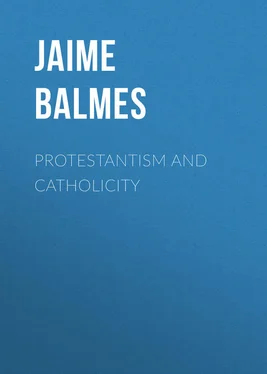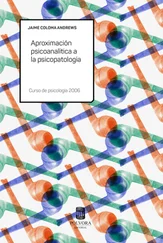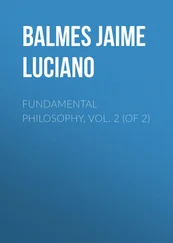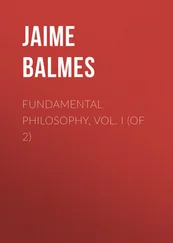Jaime Balmes - Protestantism and Catholicity
Здесь есть возможность читать онлайн «Jaime Balmes - Protestantism and Catholicity» — ознакомительный отрывок электронной книги совершенно бесплатно, а после прочтения отрывка купить полную версию. В некоторых случаях можно слушать аудио, скачать через торрент в формате fb2 и присутствует краткое содержание. Жанр: foreign_antique, foreign_prose, на английском языке. Описание произведения, (предисловие) а так же отзывы посетителей доступны на портале библиотеки ЛибКат.
- Название:Protestantism and Catholicity
- Автор:
- Жанр:
- Год:неизвестен
- ISBN:нет данных
- Рейтинг книги:3 / 5. Голосов: 1
-
Избранное:Добавить в избранное
- Отзывы:
-
Ваша оценка:
- 60
- 1
- 2
- 3
- 4
- 5
Protestantism and Catholicity: краткое содержание, описание и аннотация
Предлагаем к чтению аннотацию, описание, краткое содержание или предисловие (зависит от того, что написал сам автор книги «Protestantism and Catholicity»). Если вы не нашли необходимую информацию о книге — напишите в комментариях, мы постараемся отыскать её.
Protestantism and Catholicity — читать онлайн ознакомительный отрывок
Ниже представлен текст книги, разбитый по страницам. Система сохранения места последней прочитанной страницы, позволяет с удобством читать онлайн бесплатно книгу «Protestantism and Catholicity», без необходимости каждый раз заново искать на чём Вы остановились. Поставьте закладку, и сможете в любой момент перейти на страницу, на которой закончили чтение.
Интервал:
Закладка:
The first literary effort of Balmes before the public, was a prize essay which he wrote on clerical celibacy. This was soon followed by another production of his pen, entitled "Observations on the Property of the Clergy, in a social, political, and commercial point of view," which was elicited by the clamoring of the revolutionary army under Espartero for the spoliation of the clergy. The learning, philosophy and eloquence of the writer in this work, excited the wonder and admiration of the most distinguished statesmen in the country. Some months after, he published his "Political Considerations on the Condition of Spain," in which he had the courage to defend the rights of both parties in the country, and to suggest means of a conciliatory nature for restoring public order and tranquillity.
Amidst these political efforts, Balmes did not lay aside his peculiar functions as a minister of God. The edification of the faithful, the religious instruction of youth, and the defence of the faith against the assaults of heresy and rationalism, were constant objects of his attention. During the same year, 1840, he translated and published the "Maxims of St. Francis of Sales for every day in the year;" he also composed a species of catechism for the instruction of young persons, which was very extensively circulated. At the same time he undertook the preparation of the present work, in order to counteract the pernicious influence exerted among his countrymen by Guizot's lectures on European civilization, and to neutralize the facilities offered under the regime of Espartero for the success of a Protestant Propagandism in Spain. The occasion and object of this work rendered it expedient that it should be published simultaneously in Spanish and in French, and with this view our author visited France, and afterwards, to extend his observations, passed into England.
On his return to Barcelona, towards the close of 1842, Balmes became a collaborator in the editing of the Civilizacion , a monthly periodical of great merit, devoted to literary reviews, and to solid instruction on the current topics of the day. His connection with this work lasted only eighteen months. He then commenced a review of his own, entitled the Sociedad , a philosophical, political, and religious journal, which acquired a great reputation during the one year of its existence. Driven soon after into retirement by the disturbances of the times, Balmes composed another philosophical work, El Criterio , which is a course of logic adapted to every capacity.
From the national uprising that overthrew the government of Espartero, there arose a general feeling of patriotic independence, which called for the cessation of civil strife, and the harmonizing of the two parties that divided the nation. Many of the adherents of Maria Christina, who were the nobility and the bourgeoisie, recognized the excesses of the revolutionary faction which they had called to their aid, while the Carlists were not all in favor of absolute monarchy, and numbered an imposing majority among the lower classes. All these men of wise and moderate views longed to see a remedy applied to the wounds of their afflicted country; and with one accord they turned their eyes upon Balmes, as the only individual capable of conducting this important affair. He had already, in his Political Considerations , indicated the principal idea of his policy for putting an end to the national evils; it was a matrimonial alliance between the Queen and the son of Don Carlos. Under these circumstances he commenced in February, 1844, a new journal, entitled Pensamiento de la Nacion , the object of which was to denounce the revolutionary spirit as the enemy of all just and peaceful government, and to inspire the Spanish people with a proper reverence for the religious, social and political inheritance received from their ancestors, and with a due respect for the reasonable ameliorations of the age. In this spirit the different questions of the day were discussed with energy and calmness, and especially the project of an alliance between the Queen and the son of Don Carlos, which Balmes considered of the utmost importance. This measure, such as he proposed it, was, to use the language of his biographer, "the reconciliation of the past and the future, of authority and liberty, of monarchy and representative government." Such was the patriotism, dignity and force, with which our author conducted his hebdomadal, that it won the esteem of a large portion of the most distinguished men among the Carlists, while it also acquired favor among an immense number in the opposite party. To support its views, a daily journal, the Conciliador , was started by a body of young but fervid and brilliant writers, and nothing it would seem was wanting to insure a triumph for the friends of Spain. Prudence, energy, moderation, reason and eloquence, with a majority of the people on their side, deserved and should have commanded success; but they could not prevail against diplomatic influence and court intrigue. Balmes learned with equal surprise and affliction, in the retirement of his native mountains, that the government had resolved to offer the Queen in marriage to the infant Don Francisco, and the infanta to the Duke of Montpensier. This was a severe stroke to the sincere and ardent patriotism of Balmes. He might have resisted this policy with the power and eloquence of his pen, but he preferred a silent resignation to the heat of political strife, and the Pensamiento de la Nacion , although a lucrative publication, was discontinued on the 31st of December, 1846.
During that same year, our author collected into one volume his various essays on politics, as well for his own vindication as for the diffusion of sound instruction on the condition of Spain. The following year he completed his "Elementary course of Philosophy." But his physical strength was not equal to these arduous labors. To re-establish in some degree his declining health, he travelled in Spain and France, and remained several weeks in Paris. The intellectual and moral corruption which was gnawing at the very vitals of the French nation, and threatened all Europe with its infection, filled him with increased anxiety. He predicted the dissolution of society, and a return to barbarism, unless things would take some unexpected turn through the special interposition of Providence. This last hope was the only resource left, in his opinion, for the salvation of society and civilization, and he exulted when he beheld Pius IX opening a new career for Italy, and consecrating the aspirations and movements of all who advocated legitimate reform and rational liberty. The political ameliorations, however, of the sovereign Pontiff appeared to the opponents of liberalism in Spain, at variance with the great opposition which Balmes had always exhibited to the revolutionary spirit. Hence, it became necessary for him to pay the just tribute of his admiration to the illustrious individual who sat in the chair of Peter, and to proclaim the eminent virtues of the prince and the pontiff. This he did with surpassing eloquence, in a brochure entitled Pius IX , the brilliant style of which is only equalled by its wisdom of thought. In this work, he sketches with graphic pen, the acts of the papal policy, showing that the holy see is the best guide of men in the path of liberty and progress, that Pius IX shows a profound knowledge of the evils that afflict society, and possesses all the energy and firmness necessary to apply their proper remedy. Balmes was full of hope for the future, in contemplating the course of the great head of the church, and he cherished this hope to the last moment of his life. His essay on the policy of Pius IX was the last production of his pen. His career in literature was brief, but brilliant and effective. Eight years only had elapsed since his appearance as a writer, and he had labored with eminent success in every department of knowledge. The learned divine, the profound philosopher, the enlightened publicist, he has stamped upon his age the impress of his genius, and bequeathed to posterity a rich legacy in his immortal works. In the moral as well as in the intellectual point of view, his merit may be summed up in those words of Wisdom : "Being made perfect in a short space, he fulfilled a long time." chap. iv.
Читать дальшеИнтервал:
Закладка:
Похожие книги на «Protestantism and Catholicity»
Представляем Вашему вниманию похожие книги на «Protestantism and Catholicity» списком для выбора. Мы отобрали схожую по названию и смыслу литературу в надежде предоставить читателям больше вариантов отыскать новые, интересные, ещё непрочитанные произведения.
Обсуждение, отзывы о книге «Protestantism and Catholicity» и просто собственные мнения читателей. Оставьте ваши комментарии, напишите, что Вы думаете о произведении, его смысле или главных героях. Укажите что конкретно понравилось, а что нет, и почему Вы так считаете.












